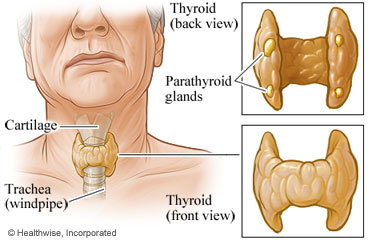Thyroidectomy: What to Expect at Home
Your Recovery

Thyroidectomy is the removal of the thyroid gland, which is shaped
like a butterfly and lies across the windpipe (trachea). The gland
makes hormones that control how your body makes and uses energy
(metabolism). A doctor removes the gland when a tumor is present.
The doctor may also remove the gland if you have an enlarged thyroid
that is causing symptoms that bother you. Most tumors that grow in
the thyroid gland are benign. This means they aren't cancer.
You may leave the hospital with stitches in the cut (incision) the
doctor made. Your doctor will tell you if you need to come back to
have these removed. You may still have a tube called a drain in your
neck. Your doctor will take this out a few days after your surgery.
You may have some trouble chewing and swallowing after you go home.
Your voice probably will be hoarse, and you may have trouble
talking. For most people, these problems get better within 3 to 4
months, but it can take as long as a year. In some cases, this
surgery causes permanent problems with chewing, speaking, or
swallowing.
This care sheet gives you a general idea about how long it will take
for you to recover. But each person recovers at a different pace.
Follow the steps below to get better as quickly as possible.
How can you care for yourself at home?

Activity

Diet
|
|
-
If it is painful to swallow, start out with cold drinks,
flavored ice pops, and ice cream. Next, try soft foods
like pudding, yogurt, canned or cooked fruit, scrambled
eggs, and mashed potatoes. Avoid eating hard or scratchy
foods like chips or raw vegetables. Avoid orange or tomato
juice and other acidic foods that can sting the throat.
|
|
|
|
|
|
-
You may notice that your bowel movements are not regular
right after your surgery. This is common. Try to avoid
constipation and straining with bowel movements. You may
want to take a fiber supplement every day. If you have not
had a bowel movement after a couple of days, ask your
doctor about taking a mild laxative.
|

Medicines

Incision
care
Follow-up care is a key part of your treatment and safety. Be
sure to make and go to all appointments, and call your doctor if you
are having problems. It's also a good idea to know your test results
and keep a list of the medicines you take.
When should you call for help?
 Call 911 anytime you think you may need emergency care.
For example, call if:
Call 911 anytime you think you may need emergency care.
For example, call if:
Call your doctor now or seek immediate medical care if:
Watch closely for changes in your health, and be sure to contact
your doctor if:
Current as of: September 27, 2023
Content Version: 14.0
Care instructions adapted under license by your healthcare professional. If you have questions about a medical condition or this instruction, always ask your healthcare professional. Healthwise, Incorporated disclaims any warranty or liability for your use of this information.